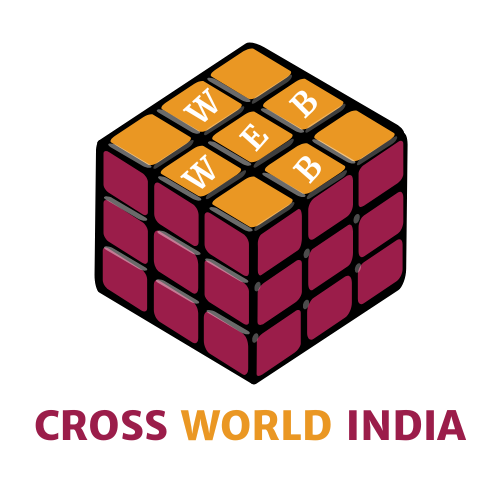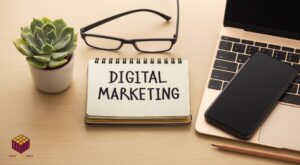What is Digital Marketing?
A Comprehensive Guide for Success in the Digital Era
Introduction
In today’s fast-paced digital landscape, businesses of all sizes are embracing the power of digital marketing to reach and engage with their target audience. But what exactly is digital marketing? This comprehensive guide aims to demystify the concept, providing you with a clear understanding of what digital marketing entails and how it can help your business thrive in the digital era.
Digital marketing refers to the use of digital channels and technologies to market products and services to a targeted audience. Unlike traditional marketing methods, digital marketing provides businesses with a cost-effective way to reach a wide range of potential customers globally. It encompasses a diverse set of strategies, including search engine optimization (SEO), content marketing, social media marketing, email marketing, pay-per-click (PPC) advertising, and more. By leveraging these digital channels, businesses can engage with their target audience, build brand awareness, generate leads, and drive sales. Digital marketing allows for precise targeting and measurable results, making it a preferred choice for businesses of all sizes.
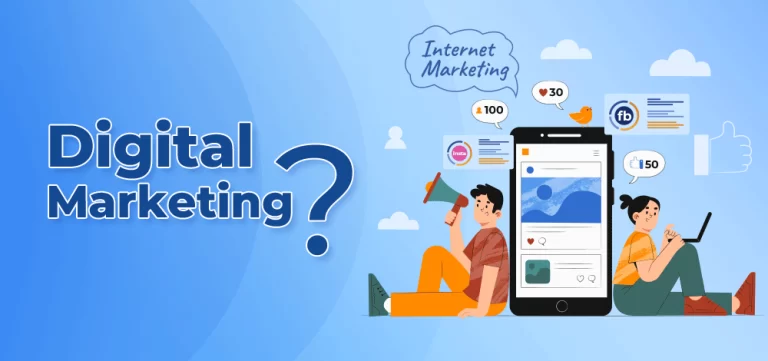
What is Digital Marketing?
Table of Contents:
What is Digital Marketing?
What is Digital Marketing?
Digital marketing encompasses all the activities, strategies, and tactics implemented to promote products, services, or brands using digital channels such as search engines, websites, social media, email, mobile apps, and more. Unlike traditional marketing methods, digital marketing leverages the power of technology and data to target specific audiences, deliver personalized messages, and measure campaign effectiveness.
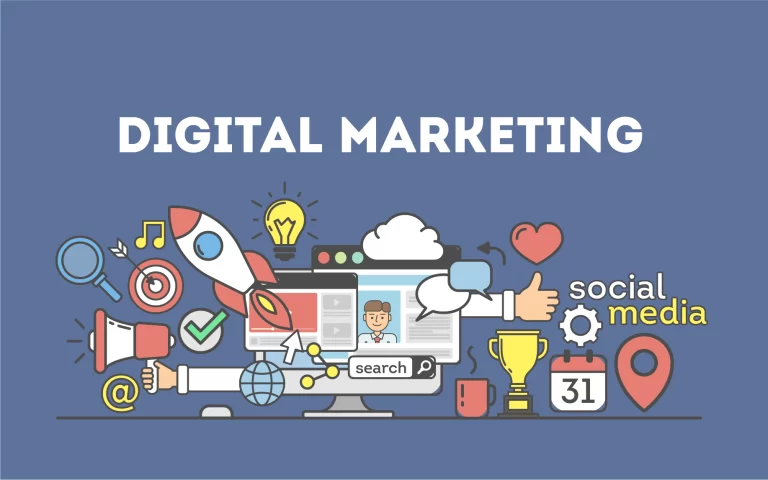
What is Digital Marketing?
Key Components of Digital Marketing
Digital marketing consists of several key components that work together to create a comprehensive strategy. These components include search engine optimization (SEO), content marketing, social media marketing, email marketing, pay-per-click advertising (PPC), and more. Each component serves a unique purpose, but they all share the common goal of driving traffic, generating leads, and converting customers in the digital space.
a) Search Engine Optimization (SEO):
SEO focuses on optimizing your website and content to improve its visibility in search engine results. By employing various strategies like keyword research, on-page optimization, and link building, you can enhance your organic rankings and drive targeted traffic to your website.
b) Content Marketing:
Content marketing involves creating and distributing valuable, relevant, and consistent content to attract and engage your target audience. It helps build brand authority, increase website traffic, and generate leads.
c) Social Media Marketing:
Social media platforms provide opportunities for businesses to connect with their audience, build brand awareness, and drive engagement. Through targeted campaigns, content sharing, and community management, social media marketing helps businesses establish a strong online presence.
d) Email Marketing:
Email marketing involves sending targeted emails to nurture leads, build relationships, and promote products or services. It is an effective way to communicate directly with your audience and drive conversions.
e) Pay-Per-Click Advertising (PPC): PPC advertising allows businesses to display ads on search engines and other platforms and pay only when users click on them. It provides instant visibility and can be highly targeted, making it an effective method for driving traffic and generating leads.
f) Influencer Marketing: Influencer marketing leverages the reach and influence of popular social media personalities to promote products or services. By partnering with influencers, businesses can tap into their audience and increase brand awareness.
g) Mobile Marketing: With the increasing use of mobile devices, mobile marketing has become crucial. It involves optimizing websites, content, and advertising for mobile users to ensure a seamless experience.
What is Digital Marketing?
Benefits of Digital Marketing
Digital marketing offers numerous benefits for businesses seeking to establish a strong online presence. These benefits include increased brand visibility, wider audience reach, cost-effectiveness, improved customer targeting, higher engagement rates, measurable results, and the ability to adapt and optimize campaigns in real-time. Digital marketing levels the playing field, allowing even small businesses to compete with larger corporations on a global scale.
Digital marketing offers numerous benefits that traditional marketing methods struggle to match. Here are some of the key advantages:
A) Increased Reach: |
With digital marketing, you can reach a global audience. The internet has no geographical boundaries, allowing you to expand your customer base and target specific demographics with precision.
B) Cost-Effectiveness:
Digital marketing provides cost-effective alternatives to traditional advertising channels. You can achieve better results with a smaller budget by targeting specific customer segments and optimizing campaigns based on real-time data.
C) Measurable Results:
Unlike traditional marketing, digital marketing allows you to track and measure the performance of your campaigns. With analytics tools, you can monitor key metrics such as website traffic, conversion rates, click-through rates, and more, enabling you to make data-driven decisions and optimize your marketing efforts for better results.
D) Targeted Advertising:
Digital marketing allows for precise audience targeting. You can tailor your campaigns to reach specific demographics, interests, behaviors, or geographical locations, ensuring that your message reaches the right people at the right time.
E) Enhanced Engagement: Digital marketing enables direct and personalized engagement with your audience. Through social media, email marketing, and other channels, you can foster meaningful relationships, address customer queries, and build brand loyalty.
F) Flexibility and Adaptability: Digital marketing provides the flexibility to adapt your campaigns in real-time. You can quickly adjust your strategies based on consumer behavior, market trends, and emerging opportunities, ensuring your marketing efforts remain relevant and effective.
What is Digital Marketing?
Digital Marketing Strategies and Tactics
To achieve success in digital marketing, it is crucial to employ effective strategies and tactics. This section explores various digital marketing strategies such as search engine optimization (SEO), content marketing, social media marketing, email marketing, influencer marketing, and paid advertising. It also delves into the importance of developing buyer personas, conducting keyword research, creating compelling content, leveraging social media platforms, crafting personalized email campaigns, and utilizing data-driven insights to optimize marketing efforts.
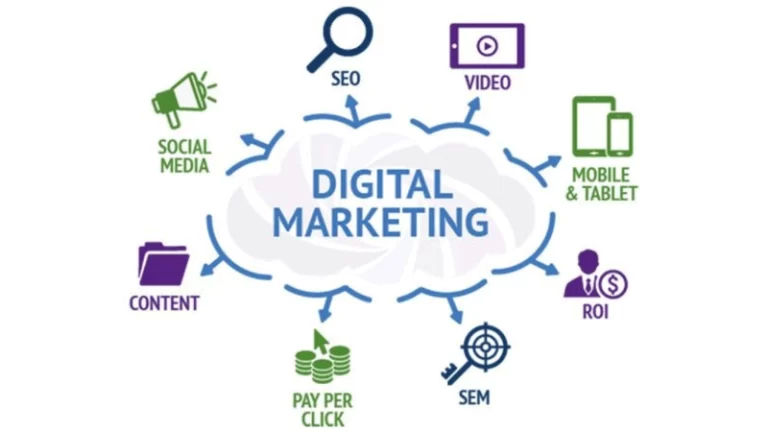
To succeed in digital marketing, it is essential to have a well-defined strategy. Here are some key steps to develop an effective digital marketing strategy:
a) Define Your Objectives:
Identify your business goals and align them with specific digital marketing objectives. Whether it’s increasing brand awareness, driving website traffic, or generating leads, clearly define what you want to achieve.
b) Understand Your Target Audience:
Conduct market research to understand your target audience’s demographics, interests, online behavior, and preferences. This knowledge will help you tailor your campaigns and messages to resonate with your audience.
c) Choose the Right Channels:
Select the digital marketing channels that align with your target audience’s preferences and behavior. Focus on the platforms where your audience is most active and receptive to your messaging.
d) Create Compelling Content:
Develop high-quality content that adds value to your audience. Whether it’s blog posts, videos, infographics, or social media content, ensure it is informative, engaging, and shareable.
e) Implement SEO Best Practices: Optimize your website and content for search engines to improve visibility and organic rankings. Conduct keyword research, optimize meta tags, improve website speed, and focus on creating high-quality backlinks.
f) Leverage Social Media: Build a strong presence on social media platforms relevant to your target audience. Create engaging content, interact with your audience, and leverage social media advertising to reach a wider audience.
g) Measure and Optimize: Regularly track and analyze your digital marketing efforts using analytics tools. Monitor key metrics, such as website traffic, conversions, engagement rates, and ROI. Use the data to refine your strategies and optimize your campaigns for better results.
Measurement and Analytics in Digital Marketing
Measurement and analytics play a pivotal role in digital marketing, allowing businesses to track the performance of their campaigns, identify areas for improvement, and make data-driven decisions. This section highlights the significance of web analytics tools, key performance indicators (KPIs), conversion tracking, A/B testing, and ROI analysis. By harnessing the power of data, businesses can continuously refine their digital marketing strategies for optimal results.
The Future of Digital Marketing
The digital marketing landscape is ever-evolving, and staying ahead of the curve is crucial for businesses to remain competitive. This section provides insights into emerging trends and technologies shaping the future of digital marketing, such as artificial intelligence (AI), voice search, chatbots, video marketing, augmented reality (AR), and machine learning. Understanding these trends and adapting to the changing digital landscape will be vital for businesses aiming to stay relevant and connect with their target audience effectively.
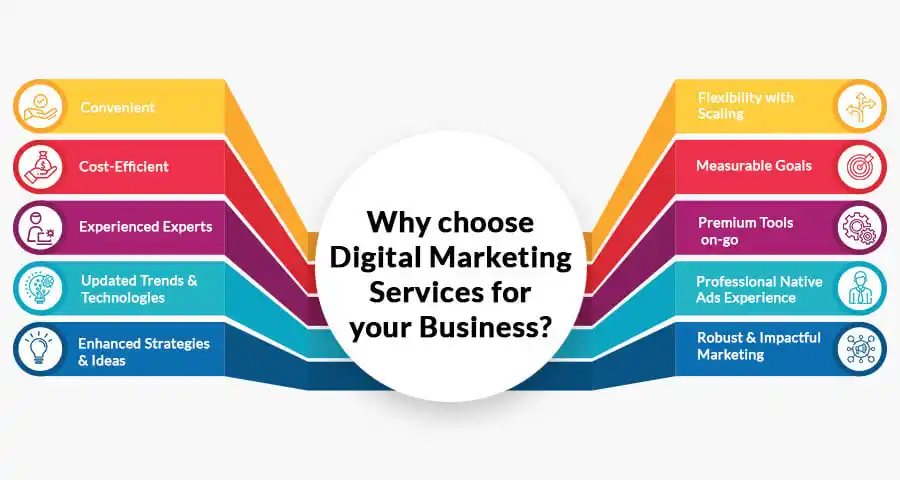
Conclusion
Digital marketing is a dynamic and multifaceted field that offers immense opportunities for businesses to grow and succeed in the digital era. By embracing the power of digital channels, leveraging effective strategies, and harnessing the insights provided by analytics, businesses can build brand awareness, engage with their target audience, and achieve tangible results. As technology continues to advance and consumer behavior evolves, the future of digital marketing holds exciting possibilities, and those who adapt and innovate will be well-positioned for continued success in the ever-evolving digital landscape.
Components of Digital Marketing:
Digital marketing has revolutionized the way businesses connect with their audience, promote their products or services, and drive growth. In today’s digital landscape, understanding the key components of digital marketing is essential for businesses to develop effective strategies and stay ahead of the competition. From search engine optimization (SEO) to social media marketing, email marketing, and more, each component plays a crucial role in reaching the target audience, driving engagement, and achieving marketing goals. In this comprehensive guide, we will explore the key components of digital marketing and how businesses can leverage them to succeed in the digital age.
Search Engine Optimization:
Search engine optimization (SEO) is the foundation of any successful digital marketing strategy. It involves optimizing a website to improve its visibility and ranking in search engine results pages. By conducting thorough keyword research, optimizing on-page elements, creating high-quality content, and building authoritative backlinks, businesses can increase their organic search traffic and attract relevant visitors to their website. A well-executed SEO strategy ensures that the website is easily discoverable by search engines and provides a seamless user experience, resulting in higher visibility, more clicks, and potential conversions.
Content Marketing:
Content marketing focuses on creating and distributing valuable, relevant, and consistent content to attract and engage a target audience. By producing blog posts, articles, videos, infographics, ebooks, and more, businesses can provide valuable information, answer customer queries, and establish themselves as thought leaders in their industry. Content marketing not only drives organic traffic to the website but also helps build brand awareness, enhance brand authority, and nurture customer relationships. By understanding the target audience’s needs and preferences, businesses can create compelling content that resonates with their audience and drives engagement and conversions.
Social Media Marketing:
Social media marketing has become an integral part of digital marketing strategies. It involves leveraging social media platforms such as Facebook, Twitter, Instagram, LinkedIn, and others to connect with the target audience, build brand awareness, and promote products or services. By creating engaging content, running targeted ad campaigns, and fostering interactions with followers, businesses can increase their online presence, generate leads, and drive website traffic. Social media marketing allows businesses to engage with their audience in real-time, gather feedback, and build a community around their brand.
Email Marketing:
Email marketing remains a highly effective component of digital marketing. By building an email list of subscribers who have shown interest in the business, companies can send targeted messages directly to their inbox. Email marketing enables businesses to nurture leads, build relationships, and promote products or services. By personalizing emails, segmenting the audience, and analyzing campaign performance, businesses can drive engagement, increase conversions, and foster customer loyalty. Email marketing is a cost-effective way to communicate with customers and stay top-of-mind, ensuring that the brand remains relevant and valuable to its audience.
Pay-Per-Click Advertising:
Pay-per-click (PPC) advertising allows businesses to display targeted ads on search engines and other online platforms. Unlike traditional advertising models, businesses only pay when a user clicks on their ad. PPC advertising platforms, such as Google Ads and social media advertising platforms, offer advanced targeting options, allowing businesses to reach a specific audience based on demographics, interests, and online behavior. With careful keyword selection, compelling ad copy, and continuous optimization, businesses can drive highly targeted traffic to their website and increase conversions.
Influencer Marketing:
Influencer marketing involves collaborating with influential individuals who have a significant following and influence over a target audience. By partnering with influencers, businesses can leverage their credibility and reach to promote their products or services. Influencer marketing can take the form of sponsored content, product reviews, endorsements, or social media takeovers. The key is to identify influencers whose values align with the brand and target audience. With the trust and engagement that influencers have built with their followers, businesses can effectively reach their target audience and drive brand awareness, engagement, and conversions.
Conversion Rate Optimization (CRO):
Conversion rate optimization focuses on improving the percentage of website visitors who take the desired action, such as making a purchase, filling out a form, or subscribing to a newsletter. Through continuous testing, analysis of user behavior, and optimizing website elements, businesses can enhance the user experience and remove barriers to conversion. A well-optimized website with clear calls-to-action, streamlined navigation, and persuasive content increases the likelihood of visitors converting into customers. By monitoring key metrics, conducting A/B tests, and making data-driven changes, businesses can maximize the return on their digital marketing investment and drive higher conversion rates.
Digital Marketing Strategies:
While digital marketing encompasses various components, certain strategies form the backbone of a successful digital marketing campaign:
Creating a Responsive Website
A well-designed, user-friendly website is essential for any digital marketing effort. It serves as the central hub for all online activities and acts as a virtual storefront. A responsive website ensures optimal viewing experiences across different devices and provides a seamless user experience, improving engagement and conversions.
Developing a Content Strategy
A robust content strategy involves creating and distributing valuable, relevant, and consistent content to attract and engage the target audience. By identifying their audience’s needs and preferences and delivering content that addresses those pain points, businesses can position themselves as industry authorities and drive organic traffic.
Harnessing Social Media Platforms
Social media platforms offer a wealth of opportunities to connect with the target audience. By developing a social media strategy that aligns with business goals, companies can build brand awareness, engage with customers, and drive website traffic. Regularly posting relevant content, interacting with followers, and leveraging paid advertising are crucial for social media success.
Leveraging Search Engine Marketing (SEM)
Search Engine Marketing (SEM) combines paid advertising and search engine optimization to improve a website’s visibility in search engine results. Through tactics like pay-per-click (PPC) advertising and keyword optimization, businesses can target specific keywords and display their ads prominently, increasing their chances of attracting relevant traffic.
Implementing Email Campaigns
Email campaigns remain an effective way to engage with leads and nurture customer relationships. By segmenting their email lists and delivering personalized and valuable content, businesses can drive conversions and build long-term loyalty. Automated email campaigns, such as welcome sequences and abandoned cart reminders, can also enhance customer engagement.
What is Digital Marketing
What is Digital Marketing
What is Digital Marketing
What is Digital Marketing
What is Digital Marketing
What is Digital Marketing
What is Digital Marketing
What is Digital Marketing
What is Digital Marketing
What is Digital Marketing
What is Digital Marketing
What is Digital Marketing
What is Digital Marketing
What is Digital Marketing
What is Digital Marketing
What is Digital Marketing
What is Digital Marketing
What is Digital Marketing
What is Digital Marketing
What is Digital Marketing
